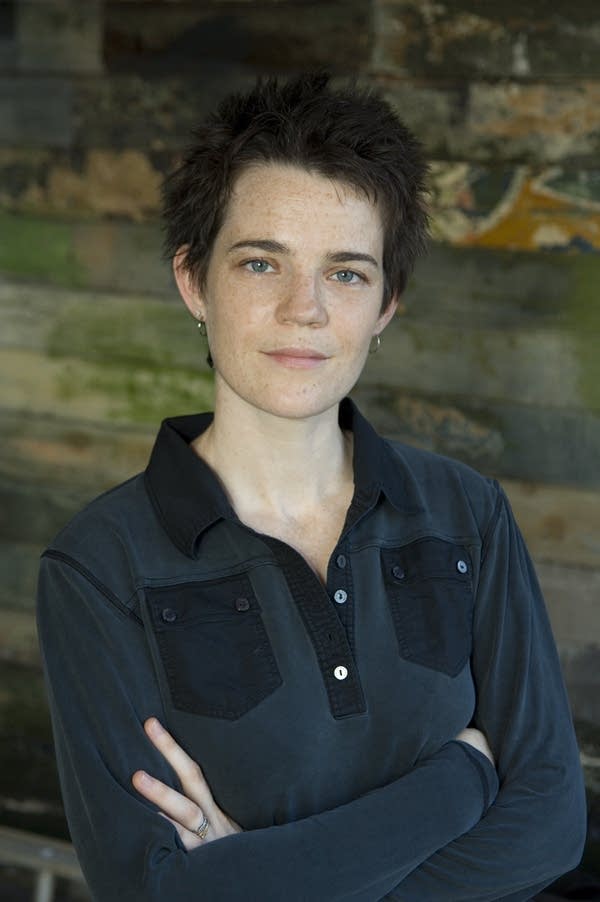The Week in Commentary
MONDAY
It took a walk along the Mississippi to teach this foreign visitor a lesson about life

David King, news editor of The Australian in Sydney and a visiting World Press Institute fellow, recounts his experience of being absorbed by a cancer walk along the Mississippi River in St. Paul.
"I arrived to find dozens of walkers streaming past, decked out in various combinations of pink and purple clothing. Their faces were flushed, and some were walking gingerly. Most walked in groups, others in pairs, a few on their own. Clearly they had been walking for a long time and it seemed they had a distance to go. ...
Create a More Connected Minnesota
MPR News is your trusted resource for the news you need. With your support, MPR News brings accessible, courageous journalism and authentic conversation to everyone - free of paywalls and barriers. Your gift makes a difference.
"I soon worked out that the event was a fundraiser to tackle breast cancer. The walkers wore tops saying 'find a cure' or 'walking 60 miles' and things like that. I thought, 'Good on 'em,' as we say down under, and turned my mind to other things: articles I would like to write, the movement of the river.
"And then I saw a guy with a picture of a woman on his T-shirt.
"I didn't get a good look, but I had time to read the words: 'I would walk forever to bring her back.' ...
"I've cried about that guy and his T-shirt again in the days since I saw him. I'm not sure why it's hit me so deeply. ... what made the T-shirt so achingly sad wasn't what it said about cancer. It was what it said about love. That it goes on forever, even after one of us leaves."
In response:
"Thank you for this essay. The day my husband was given a diagnosis of terminal brain cancer I heard the Garth Brooks song 'I'd do Anything to Make You Feel My Love.' I knew then that my mission was to make sure he felt my love every moment he had left. Love is all powerful and it is so good to be reminded as we rush through life." -- Celia Gust, Minnesota
TUESDAY
For some, showing an ID to vote would be harder than you imagine

Haddayr Copley-Woods, an author and blogger who often writes about disability issues, examines the effect a voter ID law might have on people who have trouble getting around.
"If you think this amendment is no big deal, please try to imagine for a moment: "You are disabled and unable to drive, so you have no need for a driver's license. (More and more people become disabled every day; if you can't imagine it, you might need to someday.)
"You want to vote, though, and you managed to get a ride to the polls, but living on your Social Security disability check means you'll have to skip several meals to scrape together the $22 it costs to get your birth certificate and provide it to the county. (Sure, the state has to provide you the ID for free, but you have to provide the state the necessary documentation. Your poverty has required you to move various times, and you lost your first birth certificate years ago. Or your parents never got you a copy.)
"Plus, you have to try to talk someone into giving you a ride and you feel like you've been asking people for a lot of favors lately. Oh, and also — the nearest place to get the ID is 100 miles away.
"It seems to me that if my fellow Minnesotans just sat down for a few minutes to think about how this piece of plastic they carry thoughtlessly in their wallets might mean half a week's worth of groceries to someone, or several days' anxious and exhausting travel and planning, they might see this with clearer eyes."
In response:
"Not only is voting fraud exceptionally rare, but most of those rare cases would not be prevented by the sorts of laws states are enacting, which generally require a government-issued photo ID. Such laws may be ineffective at preventing fraud, but they are extraordinarily effective at lowering turnout among black voters, students, the elderly and poor people." -- Richard Schulze, Walker, Minn.
"How hard would it be to get those 9 percent a state ID? Probably not very hard; after all, they are free. How close have some of our recent elections been, 200 votes? Every vote counts and every vote should be coming from an eligible voter." -- BB, Minnesota
"It seems like conservatives are all about less government intrusion in our lives until they aren't, like in the case of voting rights or the right to marry who we please. I'll be voting 'No' on both amendments. Conservatives should vote 'No' on principle alone." -- Jim Hartmann, Minneapolis
"It is our constitutional right to own a gun. We require an ID and a background check to get one. Would you feel comfortable if the same regulations we have for voting applied to buying a gun? If all you needed were a utility bill and a signature? Or somebody vouching?" -- Tim Saxton, Minneapolis-St. Paul
WEDNESDAY
Lawn signs have their place, but shouldn't neighbors be talking, too?

Shannon Drury, writer, at-home parent and blogger, wonders why we have to learn our neighbors' politics by reading their lawn signs.
"I didn't know the neighbor who planted the sign in her front yard, having seen her only in passing glimpses. An elderly white woman, she hadn't attended the National Night Out event I'd organized just a few weeks before, though my kids put a flyer in her mailbox. In fact, I hadn't seen her at a single block event in the nine years I'd lived on the street. ...
"She didn't know me, either, so she didn't know why I had a bright orange VOTE NO: Don't Limit the Freedom to Marry sign on my front lawn. Had we ever held a conversation, I could have explained to her my reasons for believing that the amendment was a terrible idea."
In response:
"I am reminded frequently by my friends who have run political campaigns that 'lawn signs don't vote,' but wonder, then, why so many people like to display them. Do they really influence anyone to vote a certain way? I would love to think that they are conversation starters, but wonder if they don't just make us avoid each other even more." -- Beth Johnson, Minneapolis
"A nice reminder to not assign labels and to reach out and talk to neighbors. I was a bit disappointed that the commentary ended not with the writer knocking on her neighbor's door to introduce herself, but with her sticking her ear buds back into her ears." - Nancy D
THURSDAY
Nazi Germany really did have prisoners of fashion

Linda Schulte-Sasse, professor of German at Macalester College, offers her thoughts about a German museum's exhibit on Nazi fashion.
"While we have the luxury of choosing how far we enslave ourselves to the 'dictatorship' of fashion, resisting fashion in a literal dictatorship is something else again.
"Few dictatorships were as fashion-obsessed as Nazi Germany, and a museum exhibition I visited in Germany takes up the question of just how political clothing was in the Third Reich. With the help of some 600 donated artifacts, the exhibition -- whose title translates as 'Glamour and Horror' — reminds us that no aspect of life under the Nazis was free or truly private. But neither was Nazi-era fashion all about brown shirts and black boots.
"Under National Socialism, glamour and horror were but two sides of a coin. On the glamour side were the uniforms, armbands, lapel pins and other markers that gave 'the movement' a ubiquitous visual presence: the scoutish Hitler Youth and League of German Girls' garb, the SA's brown shirts, the form-fitted SS uniforms without which we wouldn't have Darth Vader. ...
"The exhibition leaves little doubt that National Socialism was a totalitarian regime that, in the words of a curator, 'governed all the way into the sewing box.' Yet it's hard to walk through without recalling that today personal 'choice' is still a challenge, and that all too often glamour still owes a debt to horror. Media images dictating what we should put on our bodies (and how our bodies should look) are scarcely less powerful for not being government-sponsored."
FRIDAY
Why do they risk life and limb for a chance to live here?

Kristi Rendahl, a Minnesota-based writer and blogger, contemplates the dream that drives undocumented immigrants toward the United States.
"Earlier this month I was visiting Guadalajara, Mexico, and a friend invited me to see her volunteer work. She took me to a building where a long line of people were waiting. They looked like they hadn't slept or bathed in a while, and they probably hadn't, because they'd been riding on top of freight trains for several weeks. "These people will visit the site only once. If they come a second time, it's because they were caught and deported and are trying again. ...
"The people who make this journey are taking a grave chance. They risk falling off the train and losing a limb. They risk rape. They risk hunger and illness. They risk deportation. They risk kidnapping. They risk murder. Any one of them is likely to fall prey to the police, the narco traffickers or Mother Nature herself. Crossing the border between the United States and Mexico is another story altogether. ...
"For them, a life in the United States seems impossible if they stay at home and apply through the normal process. Instead, they roll the dice — with their money, with their dignity, and with their lives. Sometimes they win.
"Staying home guarantees abject poverty. If they take a risk they have a chance, a slim one, of saving an entire family."